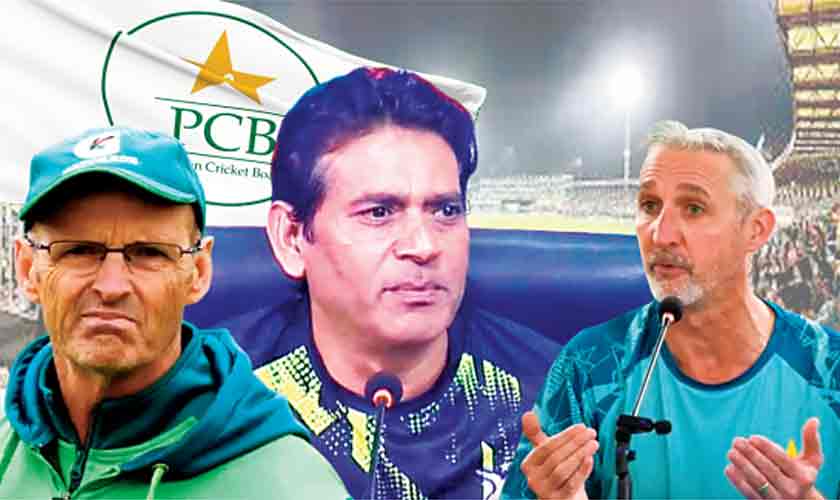
The resignation of Jason Gillespie as head coach of the Pakistan Test cricket team, following Gary Kirsten’s exit, raises pressing questions about the Pakistan Cricket Board’s (PCB) approach towards foreign coaching personnel. Both coaches were renowned figures in international cricket.
One significant issue is the precarious nature of employment within the PCB. Frequent changes in management and coaching staff create instability that is often counterproductive. Coaches like Gillespie and Kirsten expect a collaborative environment, which is often hampered by external pressures, including media scrutiny and fluctuating player forms. This constant state of flux can hinder effective long-term strategy development.
Cultural differences also play a vital role. Foreign coaches may struggle to adapt to the unique cricketing culture and the unstable nature of Pakistani cricket. The players’ expectations and attitudes toward training and professionalism vary significantly from what foreign coaches anticipate, leading to friction and eventual resignation.
Moreover, the PCB’s reliance on foreign coaches is seen as a lack of confidence in local talent. While hiring international experts can provide fresh perspectives, it raises concerns about the development and utilisation of local coaching resources. This reliance often leads to criticism from former players and commentators, who insist that the PCB should focus on nurturing domestic talent.
Gillespie was hired by the PCB to great fanfare alongside Gary Kirsten in April, with chairman Mohsin Naqvi saying his “stellar track record” preceded him. But since October, the board had cooled on the Australian, initially removing him from the selection panel for the Test side. It left him believing he was merely a “matchday analyst”. He pointed out it wasn’t what he signed up for. He is believed to have had negligible input on the selection of the Test squad for the tour of South Africa, and was out of the loop for the decision not to extend Nielsen’s contract.
Several former coaches of the Pakistan cricket team had resigned before completing their tenures, often due to a combination of challenging circumstances. Notable among them is Waqar Younis, who had two stints—his first ending in disappointment after the 2011 World Cup. The pressure from players and management led to a short-lived second tenure, highlighting the inherent instability within the team’s setup.
Another prominent figure, Mickey Arthur, had a mixed tenure, enjoying initial successes but eventually resigning after the team’s poor performance in the 2019 World Cup. His departure underscored the intense scrutiny foreign coaches face, often exacerbated by high expectations from both the PCB and fans.
Gary Kirsten, who took charge with hopes of bringing his vast experience, resigned after a brief period, citing the difficulty of adapting to the cricket culture in Pakistan.
Pakistan cricket team’s performance on the international stage has often been inconsistent. One crucial factor that can significantly influence the team’s performance is coaching. The introduction of new coaches can provide fresh perspectives, modern techniques, and a refreshed approach to training and match preparation.
New coaches bring fresh perspectives that can invigorate a team. They come with diverse experiences and insights from different cricketing cultures, which can be instrumental in breaking old patterns and introducing innovative strategies. Modern cricket demands a comprehensive understanding of both traditional techniques and contemporary advancements.
New coaches, especially those with recent playing or coaching experience, are likely to be well-versed in the latest trends in cricket training, strategy, and analytics.
In April this year, the Pakistan Cricket Board (PCB) confirmed the appointment of Gary Kirsten as white-ball head coach and of Jason Gillespie as the red-ball head coach while Azhar Mahmood was confirmed as an assistant coach across all formats.
The three appointments had been made for a two-year period following a long recruitment process. Kirsten was to be in charge of the side for next year’s ICC Champions Trophy 2025 in Pakistan, ACC T20 Asia Cup 2025 and the ICC Men’s T20 World Cup 2026 in India and Sri Lanka.
Gillespie’s assignments included the ICC World Test Championship fixtures against Bangladesh at home in August, followed by Tests against England at home in October and South Africa in the 2024-25 season.
In the ever-evolving world of cricket, the appointment of a new coach is one of the most scrutinized decisions a cricket board can make.
The Pakistan Cricket Board (PCB) had appointed Aqib Javed as the white ball coach of the national team as the interim head coach of the Pakistan men’s cricket team until the ICC Champions Trophy 2025 that it is due to host from February 19 until March 9. These appointments raised the question of why the PCB, after appointing international legends like Kirsten and Gillespie, would choose someone like Aqib, a former Pakistani cricketer with a more modest international coaching resume.
In the past two years, Pakistan cricket has ploughed through five coaches, three board heads, three captains and numerous formats of the domestic competition, while suffering a string of humiliating defeats.
But Aqib is no stranger to Pakistani cricket fans. Having represented Pakistan as a bowler in the 1990s, Aqib has a deep understanding of the intricacies of Pakistan cricket. He was a key figure in Pakistan’s 1992 World Cup-winning team, and his experience as a player gives him a unique insight into the pressures and challenges of playing at the international level.
As a coach, Aqib’s most prominent success has been with domestic sides, notably leading Lahore Qalandars to the title in the Pakistan Super League (PSL) in 2020. This triumph was seen as a significant achievement, as he not only improved the team’s performance but also helped nurture young talent in the highly competitive T20 league.
Aqib’s track record in coaching domestic teams, particularly in the PSL, showcases his ability to adapt to the changing dynamics of modern cricket. His focus on discipline, teamwork, and mentoring younger players resonates well with the current needs of the Pakistan cricket team. The PCB seems to value his pragmatic approach and his deep connection to Pakistani cricket, both as a player and coach.
Gary Kirsten, former South African cricketer and successful coach of India, was appointed as the head coach of the Pakistan men’s team. Known for his methodical and balanced approach, Kirsten’s vast coaching experience at the international level would have been expected to help Pakistan cricket develop in a more structured manner.
Similarly, Jason Gillespie, one of the most respected fast bowlers in cricket history, was brought in for his expertise in fast bowling, a key area of focus for Pakistan. Gillespie’s successful coaching stints with Adelaide Strikers and Sussex meant that he was well-placed to offer critical guidance to Pakistan’s pace attack. His knowledge of the modern demands of fast bowling, especially in limited-overs cricket, aligned with the PCB’s vision of building a more competitive pace battery.
Aqib’s appointment could be seen as a return to fundamentals. His understanding of the local playing conditions and ability to instill discipline might be key for a team that has often lacked consistency.
Aqib’s local expertise and ability to connect with the players make him an invaluable asset in the long-term development of the team.
One of the challenges Pakistan cricket has faced is the lack of depth in the squad. New coaches can focus on building a strong bench strength by nurturing young talent and providing opportunities to emerging players. This ensures that the team has a pool of ready-to-perform players who can step up when needed. By investing in the development of young cricketers, coaches can create a sustainable pipeline of talent for the future.
The introduction of new coaches can be a transformative step for the Pakistan cricket team. Fresh perspectives, modern techniques, enhanced skill development, psychological support, tactical acumen, fitness regimes, leadership building, technological integration, and strong bench strength are areas where new coaches can make a significant impact. By embracing these changes, Pakistan can harness its immense talent and potential, leading to improved performances and greater success on the international stage. The road to consistency and excellence is challenging, but with the right coaching staff, Pakistan can achieve remarkable progress and reestablish itself as a formidable force in world cricket.
khurrams87@yahoo.com




